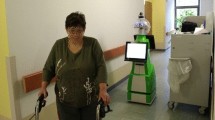Abstract
This paper wants to make a further contribution towards a more transparent and systematic technical evaluation of implemented services and underlying HRI and navigation functionalities of socially assistive robots for public or domestic applications. Based on a set of selected issues, our mobile walking coach robot developed in the recently finished research project ROREAS (Robotic Rehabilitation Assistant for Walking and Orientation Training of Stroke Patients) was evaluated in three-stage function and user tests, in order to demonstrate the strengths and weaknesses of the developed assistive solution regarding the achieved autonomy and practicability for clinical use from technical point of view.
Access this chapter
Tax calculation will be finalised at checkout
Purchases are for personal use only
Similar content being viewed by others
References
Steinfeld, A., Fong, T., Kaber, D., Lewis, M., Scholtz, J., Schultz, A., Goodrich, M.: Common metrics for human-robot interaction. In: Proceedings of HRI, p. 3340 (2006)
Bonsignorio, F., del Pobil, A.P.: Toward replicable and measurable robotics research. IEEE Robot. Autom. Mag. 3, 32–35 (2015)
Feil-Seifer, D., Mataric, M.: Socially assistive robotics. IEEE Robot. Autom. Mag. 1, 24–31 (2011)
Gross, H.-M., Boehme, H.-J., et al.: TOOMAS: interactive shopping guide robots in everyday use - final implementation and experiences from long-term field trials. In: Proceedings of IROS, pp. 2005–2012 (2009)
Gross, H.-M., Schroeter, C., et al.: Further progress towards a home robot companion for people with mild cognitive impairment. In: Proceedings of SMC, pp. 637–644 (2012)
Gross, H.-M., Mueller, S., et al.: Robot companion for domestic health assistance: implementation, test and case study under everyday conditions in private apartments. In: Proceedings of IROS, pp. 5992–5999 (2015)
Gross, H.-M., Debes, K., et al.: Mobile robotic rehabilitation assistant for walking and orientation training of stroke patients: a report on work in progress. In: Proceedings of IEEE-SMC, pp. 1880–1887 (2014)
Gross, H.-M., Scheidig, A., et al.: ROREAS: Robot coach for walking and orientation training in clinical post-stroke rehabilitation - prototype implementation and evaluation in field trials. Autonomous Robots (2016). doi:10.1007/s10514-016-9552-6
Trinh, T.Q., Schroeter, C., Kessler, J., Gross, H.-M.: “Go ahead, please”: recognition and resolution of conflict situations in narrow passages for polite mobile robot navigation. In: Tapus, A., André, E., Martin, J.-C., Ferland, F., Ammi, M. (eds.) Social Robotics. LNCS, vol. 9388, pp. 643–653. Springer, Switzerland (2015)
Eisenbach, M., Vorndran, A., et al.: User recognition for guiding and following people with a mobile robot in a clinical environment. In: Proceedings of IROS, pp. 3600–3607 (2015)
Meyer, S., Fricke, C.: Robot companions for stroke therapy - studying the acceptance of assistive robotics among 80 patients in neurological rehabilitation. In. Proceedings of Kongress “Zukunft Lebensräume” (in German), pp. 16–24 (2016)
Author information
Authors and Affiliations
Corresponding author
Editor information
Editors and Affiliations
Rights and permissions
Copyright information
© 2016 Springer International Publishing AG
About this paper
Cite this paper
Gross, HM., Eisenbach, M., Scheidig, A., Trinh, T.Q., Wengefeld, T. (2016). Contribution Towards Evaluating the Practicability of Socially Assistive Robots – by Example of a Mobile Walking Coach Robot. In: Agah, A., Cabibihan, JJ., Howard, A., Salichs, M., He, H. (eds) Social Robotics. ICSR 2016. Lecture Notes in Computer Science(), vol 9979. Springer, Cham. https://doi.org/10.1007/978-3-319-47437-3_87
Download citation
DOI: https://doi.org/10.1007/978-3-319-47437-3_87
Published:
Publisher Name: Springer, Cham
Print ISBN: 978-3-319-47436-6
Online ISBN: 978-3-319-47437-3
eBook Packages: Computer ScienceComputer Science (R0)




